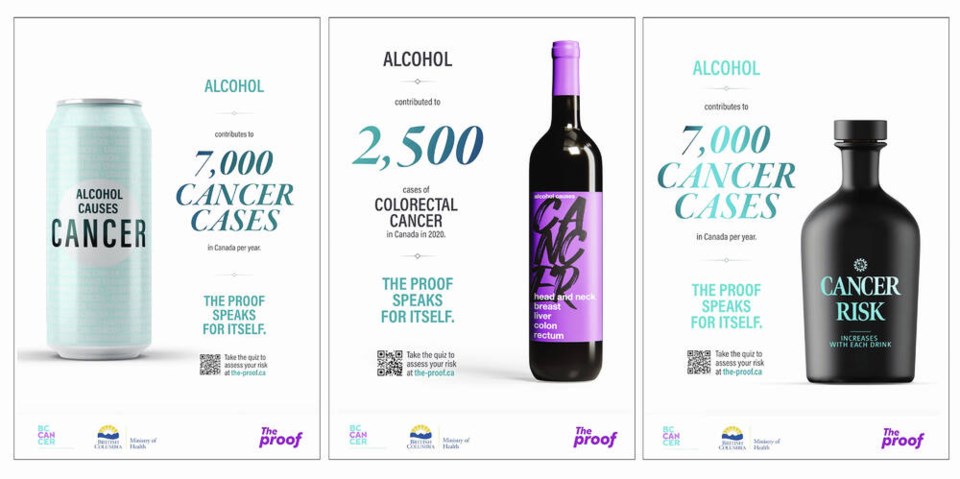After decades of industry ads promoting alcohol as key to a good time at any social gathering, a new public awareness campaign in B.C. is sending a more sober message — alcohol causes cancer.
Canada’s new Low-Risk Alcohol Drinking Guideines, released in January, say drinking alcohol increases the risk of developing breast, colon, rectum, mouth and throat, liver, esophagus, and larynx cancers.
The new guidelines suggest women can imbibe a maximum two standard drinks per week and men can have three before negative health consequences occur.
To ensure the message is getting out, B.C. Cancer, in partnership with the B.C. Health Ministry, is launching a public awareness campaign with the tag line “the proof speaks for itself.”
The “proof” is a play on alcohol potency and the mounting evidence that alcohol causes some cancers and no amount is good for you.
Using graphics of beer cans and wine bottles, the posters say that in 2020, alcohol contributed to 2,500 colorectal cancers and was linked to 1,700 breast-cancer cases.
Cheryl Peters, a senior scientist for cancer prevention at B.C. Cancer and B.C. Centre for Disease Control, said the agency wants people to fully understand the potential risks of drinking alcohol.
“Almost everybody knows and trusts that smoking causes cancer, and almost everybody knows and trusts that UV radiation from the sun causes skin cancer,” said Peters, “but they don’t tend to know about these other links with really serious diseases like cancer.”
Peters said she’s up for the challenge of countering the alcohol industry’s lobbying efforts. “I feel inspired by it,” she said. “This is the work that kind of I signed up to do.
“It is important to me that people get a sense of all of the risks that they’re taking in their lives so that they can make informed choices for themselves.”
The new guidelines list one to two standard drinks per week as low risk, three to six per week as moderate risk, and seven or more a week as “high risk.” A standard drink is a five-ounce glass of wine, a 12-ounce bottle of beer or cooler, and a 1.5 ounce shot of spirits.
When you’re pregnant or trying to get pregnant, there is no known safe amount of alcohol, according to the Canadian Centre on Substance Use and Addiction.
It’s a drastic change from the former guidelines, which suggested limiting alcohol to 10 drinks a week for women and 15 drinks for men.
Cancer-prevention experts and public health officials see promoting the new guidelines as especially urgent given that almost 20 per cent of Canadians age 18 and older increased their alcohol use during the pandemic.
Alcohol will affect different people in different ways depending on a person’s other health-related behaviours, like smoking, as well as genetics, said Peters.
“Drinking and smoking together can increase the risk of throat cancers and cancers of the mouth quite a bit more than just either one on its own.”
The causes of cancer are multi-factoral and and there’s not often a “smoking gun,” said Peters, but scientists do know how alcohol affects the body.
It can cause inflammation or damage to DNA over time, or prevent the body from repairing damage. It can affect the cells in the mouth and throat, making it easier for cancer-causing substances, like tobacco smoke, to get absorbed.
It can elevate levels of estrogen and other hormones in the blood that increase the risk of breast cancer, and it can damage the stomach and intestines, making it hard for the body to absorb key nutrients, such as folate, which helps the body build new cells and prevents changes in DNA.
Peters said scientists have a hard time ranking the potency of various carcinogens, “but in general, smoking causes a lot more cancers that we’re experiencing right now than alcohol does.”
Scientists estimate that alcohol causes around 7,000 cases of cancer a year, out of around 100,000 total cases of cancer in Canada a year, she said.
Dr. Tim Naimi, one of three scientists at UVic’s Canadian Institute for Substance Use Research who was on the expert committee that formulated Canada’s new alcohol guidelines, said in January that education is important, but not as effective as strong public policies around alcohol pricing, availability, labelling and advertising.
Peters said B.C. and other governments across Canada are considering all these public policy options and she supports them all — with some delicate balancing of the role alcohol plays in some cultural traditions, for example.
Peters said the goal of the campaign is to empower people with information to make healthier choices as part of a harm-reduction approach, and not to stigmatize anyone, especially those struggling with addiction.
“This is not about blaming individuals,” said Peters. “It’s really about just getting the knowledge into the hands of people without that stigma attached, because we know that stigma doesn’t work.”
Take a quiz to assess your risk at the-proof.ca
>>> To comment on this article, write a letter to the editor: [email protected]




